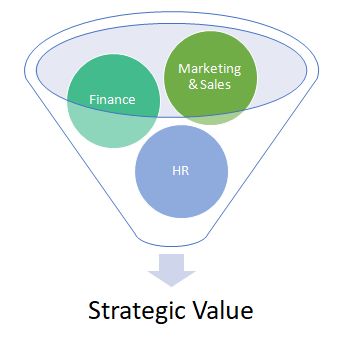Strategic Value of Marketing and the Role of Marketers
Strategic Importance of Marketing

Introduction
The limited perspective of most CEOs on marketing makes them do awkward things. However, they alone cannot be blamed because the pressure of short term results is on most CEOs is so high that rather than focusing on long term impact from marketing, they use it mainly to drive sales. It is why rather than seeing marketing as a strategic function and investing in it for long term value, they see it as an expenditure for generating revenue and profits. Not just Kotler, but most top marketers of the era stress on the strategic value of marketing for full impact. The idea is to not to see it as a function but to see it as a part of the strategic team as Nirmalya Kumar of London Business school has noted in his book "Marketing as Strategy: Understanding the CEO's Agenda for Driving Growth and Innovation". The book underlines the strategic value of marketing for achieving long term impact and not just shot term revenue and profits. Nirmalya spells out how marketers can prove their strategic value in their organizations and make their businesses win. The problem is that marketing is being seen in seclusion and as distinct from other functions. The marketing function consumes money and always asks for more. The task before the marketers is not easy and companies and leaders are looking for real impact. If marketers are to prove their strategic value for their companies, they need to use a broader outlook and not just remain stuck with the four P's.
Challenges Before the Marketers
The problem as Nirmalya spells out is how these roles are seen across organizations. These marketers are not seen as strategists providing strategic support to the CEOs, helping them lead initiatives with organization wide and long term impact but as tacticians, who mainly remain immersed in the four P's and not going beyond product, place, price and promotion. This Nirmalya sees as a short sighted perspective on marketing. However, there is also a strong reason that these CEOs are forced to keep this limited perspective. The pressure from investors and shareholders on them to create short term financial value is high and it makes them lose sight of the long term value of marketing. You will easily encounter roles like COO (Chief Operating Officer), CFO (Chief Financial Officer), and even CTO (Chief Technology Officer), but coming across a Chief Marketing Officer (CMO) is difficult. Marketers must not think that the CEO or someone else will help them acquire the position but the burden is on the marketers themselves to prove their value. CEOs remain unsure if the spending on marketing is going to generate real returns. In such a scenario, it is upon the marketers themselves that their ideas excite the CEOs and have definite organization-wide and bottom line impact.
Strategic Value from Marketing

What Marketers Must Do?
How can marketers achieve this? The first thing that Nirmalya highlights and which is to be considered most important is that Marketers need to be more open minded and more cross thinking to make their ideas win. These things cannot be handled by the marketing function alone. The role of the other functions like HR and finance is also critical. The same is true about the impact of the marketing efforts. Their impact too must be cross functional. Marketers must work to engage the top leadership and the CEOs to add value to their company. They can engage them to meet two major challenges that almost all the companies face. They are improving customer loyalty and reducing downward pressure on prices. To meet the challenge, companies are looking for growth solutions like expanding or growing new distribution channels, not selling products but solutions that address needs and pursuing radical innovation. Marketers can take leadership positions and lead initiatives if they are willing to include the other functions. Moreover, the needs have changed in the modern era and the global markets have given rise to new needs where balancing between the global and local strategies may become difficult. Marketers must see where their efforts are adding real value. The need to balance between the global and local strategies creates tension. Market research and cross cultural movement of managers are two answers to this problem. Market research allows to examine the issue in a more objective manner and by moving managers across nations to enhance communication, companies have been able to solve the challenge to a large extent. The value of communication is important because at various places cultural differences can give rise to a need for localized strategies.
Another important factor is technology and it has started playing a critical role in marketing. However as Nirmalya warns, adopting it can have both kinds of results - good and bad. In this regard, he is right because technology needs to be used mindfully. Marketers must not rely mindlessly on any kind of technology and rush to adopt it because both rewards and risks can result from it. Instead they must ask themselves questions regarding the use and credibility of that technology and the kind of results that they seek to generate from it. Marketing has to be driven by results because the pressure on the CEOs to create financial value is immense and they cannot shake it off. Still, if marketers too start following the definite track, the result would be short term impact and loss of value.
Conclusion
If marketing has to prove its strategic value then the marketers must be first to understand it. While the strategic value of marketing is significant, to persuade the CEO is never easy. A clear and well defined marketing strategy can help organizations clear several kinds of hurdles but for it to be impactful, it must also create excitement. If marketers miss on this part, their job would become even difficult. Another critical thing that marketers must mind is that if they try to be successful alone then they must be cautious. Cross functional thinking and cross functional collaboration can save marketing executives both time and efforts. The market has grown globalized and creating winner marketing strategies is not so easy, but if marketers can adopt a cross functional thinking, they can generate the kind of value they expect easily. With globalization, competition has become the norm and to win against competition is not easy. Every marketing strategy has to be well crafted to win and there is a lot of confusion being created due to competition. The success of an organization does not depend exclusively on marketing but still depends on it to a large extent on it. Apart from showcasing a brand’s products and services, marketing also aims to create a positive perception of the brand in the consumers’ minds. However great the pressure for financial value on the CEOs, the target cannot be achieved by using short sighted marketing strategies. The strategic importance of marketing has grown but with it challenges before marketers have also grown which is happening due to changing market dynamics, increased globalization and higher level of competition. Every brand is faced with challenges and a great marketing strategy plays a more solid role than just pushing sales. Marketers can make their mark, but instead of thinking in a limited perspective, they have to push the limit further because the level of competition in the market place will not let them sit easy. Marketing can be a firewall against competition, but only if it can create real and long term impact.
Marketing Strategy with Kotler
© 2017 Abhijeet Pratap








